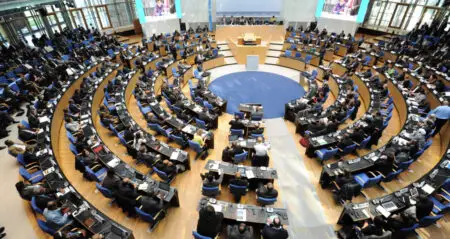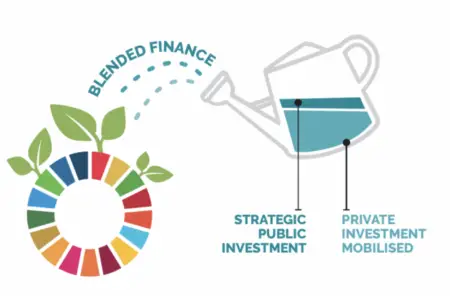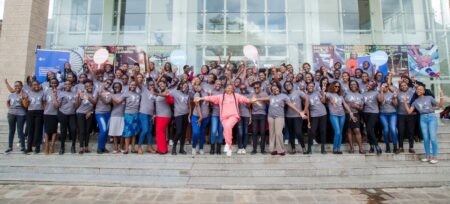- How South Africa plans to counter the negative impact of Trump tariffs sting
- Africa’s BPO industry enters AI era with 40% of tasks at risk by 2030
- Trump tariffs sting set to ruffle several economies in Africa
- Africa Energy Bank secures key backing from Nigeria, Angola and Ghana
- AIM Congress 2025 gets a boost as International Development Bank signs on as gold sponsor
- African energy: Opportunities and challenges presented by Russia’s investments
- Africa’s smart farming push—a revolution or a mirage?
- BRICS summit in Brazil to focus on global governance reform
Browsing: Africa
- Most East African family businesses believe that it is essential to be trusted by customers, employees and family members.
- Among those who consider trust among each group important: 56% are fully trusted by customers, 47% are fully trusted by employees and 77% are fully trusted by family members.
- East Africa’s level of trust is slightly higher than global survey on family businesses.
Family businesses in East Africa demonstrated robust performance over the past financial year, with 64 percent experiencing growth, compared to 46 percent in 2021, as indicated by a survey conducted by the advisory firm PwC. The PwC’s East Africa Family Business Survey 2023 affirms the resilience of family businesses, consistently overcoming geopolitical challenges.
Despite their success, experts emphasize that these businesses must adopt new priorities to ensure the longevity of their legacies. The landscape of building trust in business is undergoing a fundamental and rapid transformation. Environmental, Social, …
- The Nigeria-Saudi Business Council could see the Middle Eastern country fund several sectors of the West African economy.
- Through the council, the Kingdom of Saudi Arabia plans to replicate various investments made in Pakistan, Indonesia, and India in Nigeria.
- Africa has increasingly become the subject of high competition between global economic powers.
Nigeria anticipates multi-billion-dollar “immediate” investment flows from the Kingdom of Saudi Arabia. This follows the signing of an agreement between the countries to establish a business council. The Nigeria-Saudi Business Council could see the Middle Eastern country fund several sectors of the West African economy. These include technological advancements, telecommunications, energy, oil and gas, and agriculture.
The two countries resolved to restore the Nigeria-Saudi Business Council. Crown Prince Mohammed bin Salman Abdulaziz proposed the Business Council in 2019. However, the former president of Nigeria, Mahammadu Buhari, resisted the council.
“We expect to see significant investment flow immediately,” Abubakar …
- Artificial Intelligence (AI) offers new job opportunities for tech-savvy African graduates.
- African policymakers must, however, protect current employees from job losses in the new AI era.
- Gen AI has the potential to offer solutions for Africa’s medical, nutrition, and financial difficulties.
Artificial intelligence (AI) is the new frontier, offering numerous possibilities for efficient productivity. However, what does it mean for Africa’s job sector?
AI means new job opportunities for tech experts. Yet, it also means lost jobs for less tech-savvy staff. For example, Generative Artificial Intelligence (Gen AI) can generate text, images, or other media using generative models. This implies that graphic designers, copywriters, artists, personal assistants, and others are no longer needed.
“Gen AI is being embedded in everyday tools like email, word processing applications, and meeting software, which means the technology is already positioned to radically transform how people work,” writes Sandra Durth, a researcher with consulting firm, …
Global climate negotiators have reached a framework for climate financing to deal with loss and damage in the run-up to the COP28 in Dubai.…
According to John Howkins, the orange economy incorporates industries whose goods and services arise from intellectual property. These include research and development, radio and TV, visual and performing arts, publishing, advertising, music, software, gaming, design, film, crafts, architecture, fashion, and design. Artists, cultural non-profits, and creative businesses can produce and disseminate goods and services that generate jobs, revenue, and quality of life.…
Africa’s oil and gas industry is entering a new era. The world is looking to fast-track its transition from fossil fuels. Consequently, this puts pressure on the continent’s oil and gas-producing nations. Most producing countries remain highly exposed to the global energy transition since their economies depend on oil and gas revenues. Similarly, their oil and gas reserves cost more to produce and, on average, remain more carbon-intensive than those from other regions.…
With its immense potential and vast resources, Africa stands at a critical point in its economic growth path. While the continent has promising economic prospects, it also has significant challenges that have impeded growth. A concept known as “blended finance” has gained popularity in recent years as a viable answer to assist governments in overcoming economic challenges. As a result, it is vital to look into what blended finance is, how African economies can leverage its benefits and its crucial role in supporting sustained growth across the continent.…
Africa is a continent of diverse religions, cultures, and intricate histories. Christianity is one of the major faiths that has shaped the lives and identities of millions of Africans. The continent has also evolved beyond its spiritual dimension to encompass a thriving business aspect.
Numerous churches and religious organizations have ventured into various economic activities, generating income and wielding significant influence. Consequently, some churches have become mega-churches with thousands of members and millions of dollars in revenue. They often own businesses such as schools, hospitals, media outlets, and real estate investments.…
- The demand for cybersecurity skills in Africa has increased by 35% over the past year.
- Africa has a significant digital skills gap, which could create 650 million training opportunities and a $130 billion market by 2030.
- An increasing number of companies are working to develop programs to reduce the IT skills gap on the continent.
Over the past few years, Africa is facing a significant digital skills gap, which is stunting growth of economies for the majority of the continent’s nations.
A study by the International Finance Corporation (IFC) indicates that by 2030, about 230 million jobs across the continent will require some level of digital skills. These opportunities have the potential of giving rise to 650 million training opportunities and an estimated $130 billion market.
To harness the emerging opportunities, an increasing number of local and international firms are developing programs to help reduce the IT skills gap on …
According to Investopedia, a gig economy is a labour market mainly reliant on temporary and part-time work filled by independent contractors and freelancers rather than full-time permanent employees. A gig economy produces cheaper, more efficient services for those willing to use them.
A gig is a broad category that includes a wide range of positions. Work can range from cab driving or restaurant delivery to writing code or freelance essays. Instead of tenure-track or tenured professors, adjunct and part-time professors are contracted employees. By recruiting more adjunct and part-time teachers, colleges and universities can save costs while also better-matching instructors to academic needs.…














